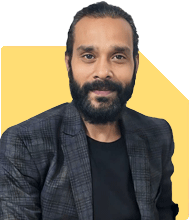Sushil Sukhwani | Answer |Ask -Follow
Study Abroad Expert - Answered on Apr 13, 2024

My son is doing his second year in physiotherapy. He is interested in doing masters in sports physiotherapy in Real Madrid. Where he can get exposure to football clubs. What wld be the tuition fees and cost of living in Spain. Are there possibilities of getting scholarship. What are the requirements to earn a scholarship
First and foremost, thank you for getting in touch with us. I am happy to know that your son is currently pursuing the second year of his Bachelor of Physiotherapy after which he intends pursuing his Master's in Sports Physiotherapy. For your son, pursuing a Master's degree in Sports Physiotherapy in Spain, particularly in Real Madrid, could be a thrilling opportunity. Remember that precise estimations about living expenses, tuition costs, and scholarship options may differ, and for that reason it's best to get in touch with the institution directly in order to acquire the most precise and recent information. Consider the following for a better idea. Firstly, concerning your question pertaining to the tuition fees, I would like to let you know that based on the university, length of the program, and whether your son is an EU or non-EU citizen, tuition costs to pursue a Master’s program can differ to a great extent. Generally, international students have to pay higher tuition fees in comparison to EU citizens. In order to acquire the most precise information on tuition costs for overseas students, I would suggest that your son visits the official website of the institutions he’s interested in. Next, pertaining to your query regarding the cost of living, I would like to tell you that based on your son’s way of living, the living expenses in Spain, particularly in major cities like Madrid, can also differ. Typically, food, housing, transit, and other expenditures may increase the overall cost. Another considerable expenditure could be incurred through renting an apartment or room, particularly in cities. Nevertheless, Spain is relatively cheaper in comparison to other Western European nations. Coming to scholarship possibilities, scholarships based on academic merit, financial requirement, or other factors, may be available to international students although these might be competitive. Scholarships particularly for Master's in sports physiotherapy or associated fields, should be looked into by your son. Moreover, for overseas students studying in Spain, external agencies or government scholarships may also be available. Lastly, concerning your query regarding scholarship requirements, I would like to let you know that based on the scholarship provider, the prerequisites for scholarships may differ. Applying for a scholarship typically entails submitting academic marksheets, a statement of purpose/personal statement, endorsement letters, and perhaps evidence of financial need. Criteria particular to the field of study or extracurricular activities may also be demanded by few scholarships. I would suggest that your son carefully researches each scholarship's qualifying conditions and application prerequisites, making sure he adheres to all deadlines.
In order to pursue his Master's in Sports Physiotherapy in Real Madrid, I would recommend that your son conducts an all-round study and prepares beforehand in terms of money, grant opportunities, and application conditions. Moreover, for invaluable advice and direction all through the application procedure, your son should get in touch with the admissions office or the international student services department of the institution.
There are Universities who offer this course , however you need to check with the universities do they have football clubs . The average tuition fees can be around 12- 17 lakhs (INR) and cost of living around 5-10 lakhs . Scholarships are usually merit based or early bird. For merit based scholarships, final CGPI should be good in order to get scholarships.
For more information, you can visit our website.
You may like to see similar questions and answers below
Mayank Chandel |2569 Answers |Ask -Follow
IIT-JEE, NEET-UG, SAT, CLAT, CA, CS Exam Expert - Answered on Apr 05, 2023
Dr Pananjay K Tiwari | Answer |Ask -Follow
Study Abroad Expert - Answered on Aug 26, 2024
Prof Suvasish Mukhopadhyay | Answer |Ask -Follow
Career Counsellor - Answered on Jan 23, 2025
Radheshyam Zanwar |6737 Answers |Ask -Follow
MHT-CET, IIT-JEE, NEET-UG Expert - Answered on Nov 04, 2024
Dr Pananjay K Tiwari | Answer |Ask -Follow
Study Abroad Expert - Answered on Jan 16, 2025
Mayank Chandel |2569 Answers |Ask -Follow
IIT-JEE, NEET-UG, SAT, CLAT, CA, CS Exam Expert - Answered on Dec 08, 2025
Mayank Chandel |2569 Answers |Ask -Follow
IIT-JEE, NEET-UG, SAT, CLAT, CA, CS Exam Expert - Answered on Dec 08, 2025

Mayank Chandel |2569 Answers |Ask -Follow
IIT-JEE, NEET-UG, SAT, CLAT, CA, CS Exam Expert - Answered on Dec 08, 2025
Mayank Chandel |2569 Answers |Ask -Follow
IIT-JEE, NEET-UG, SAT, CLAT, CA, CS Exam Expert - Answered on Dec 08, 2025
Mayank Chandel |2569 Answers |Ask -Follow
IIT-JEE, NEET-UG, SAT, CLAT, CA, CS Exam Expert - Answered on Dec 08, 2025
Anu Krishna |1746 Answers |Ask -Follow
Relationships Expert, Mind Coach - Answered on Dec 08, 2025
Ramalingam Kalirajan |10874 Answers |Ask -Follow
Mutual Funds, Financial Planning Expert - Answered on Dec 08, 2025
Samraat Jadhav |2499 Answers |Ask -Follow
Stock Market Expert - Answered on Dec 08, 2025
Ramalingam Kalirajan |10874 Answers |Ask -Follow
Mutual Funds, Financial Planning Expert - Answered on Dec 08, 2025
Radheshyam Zanwar |6737 Answers |Ask -Follow
MHT-CET, IIT-JEE, NEET-UG Expert - Answered on Dec 08, 2025


























